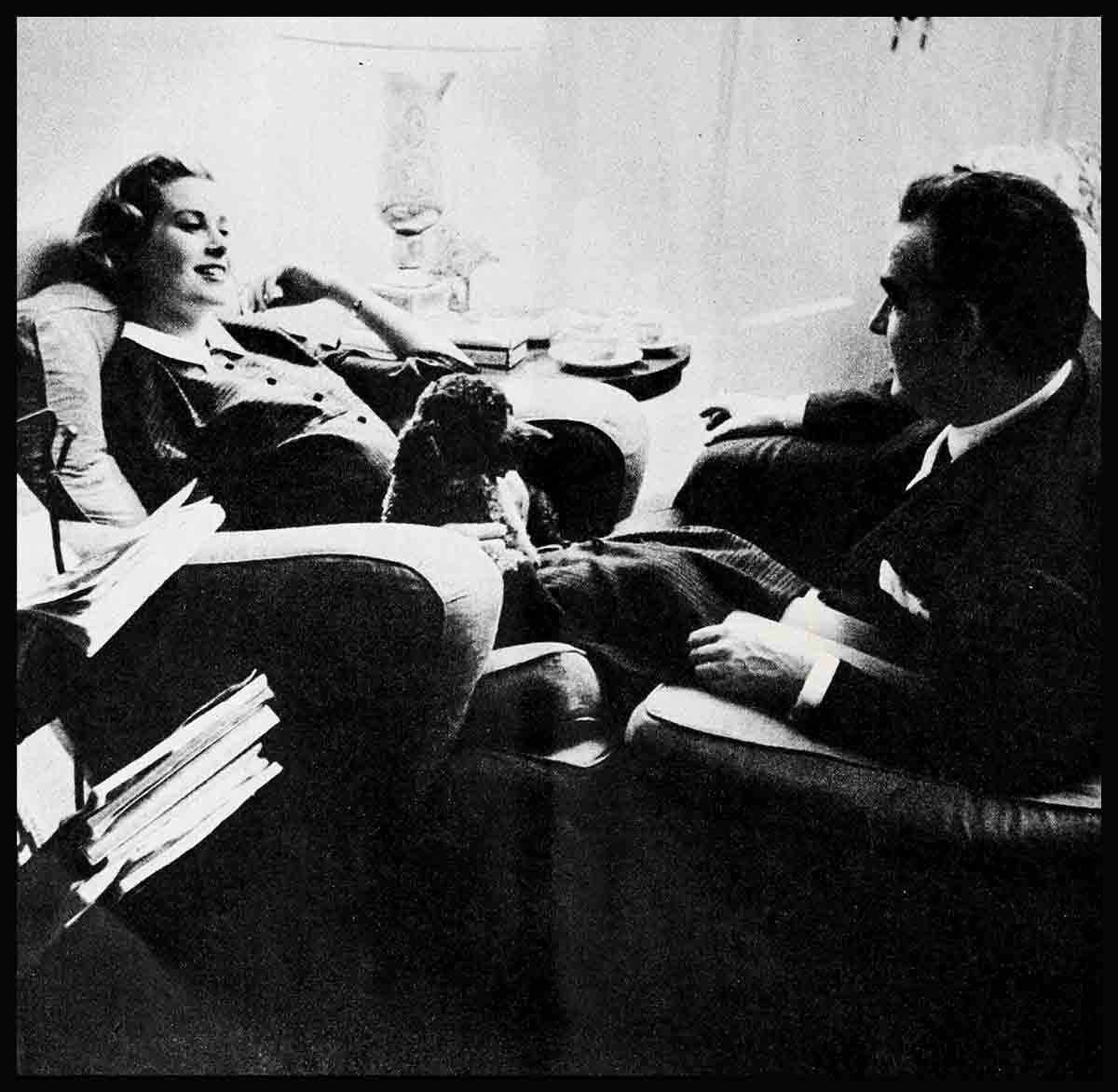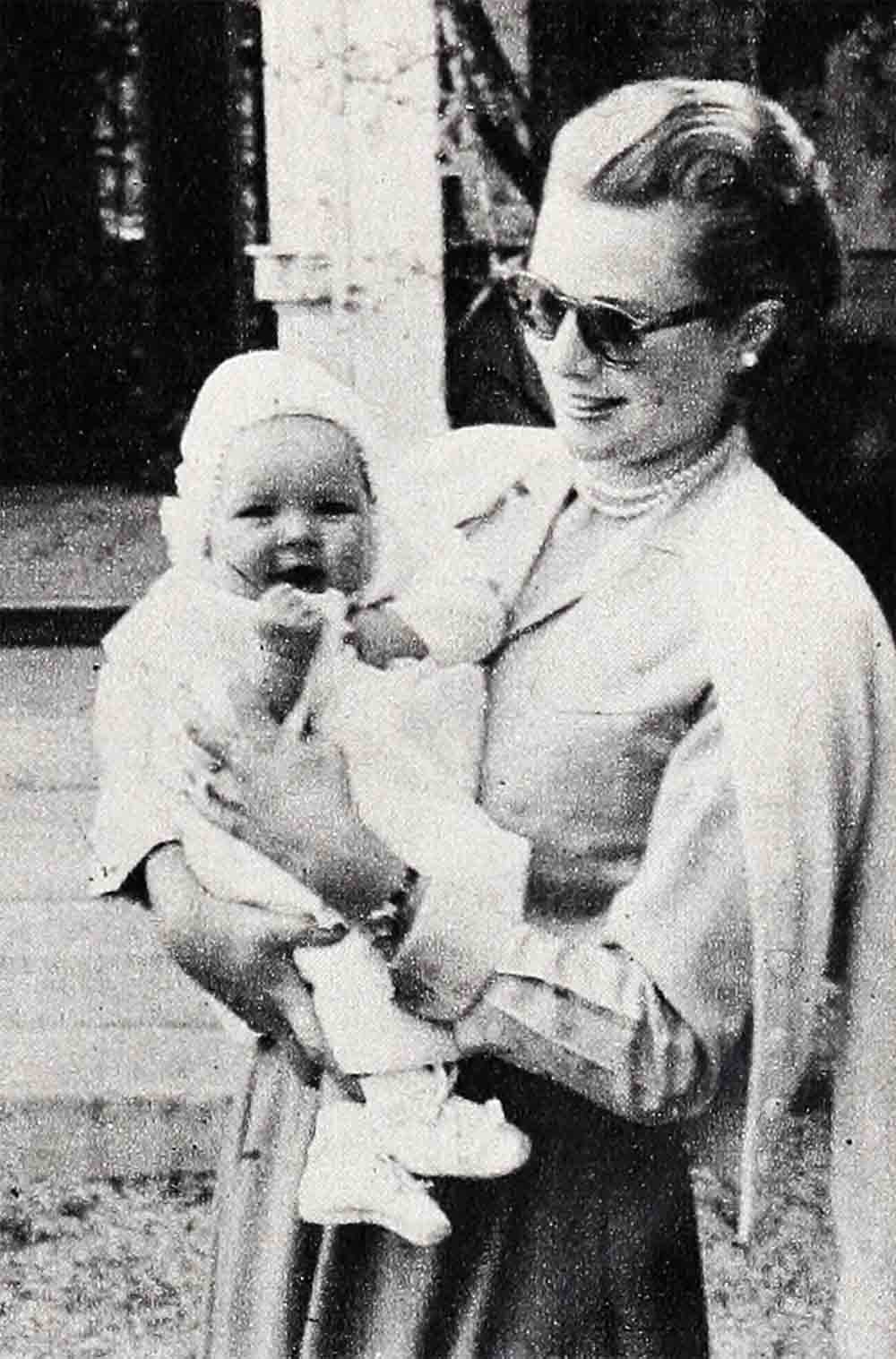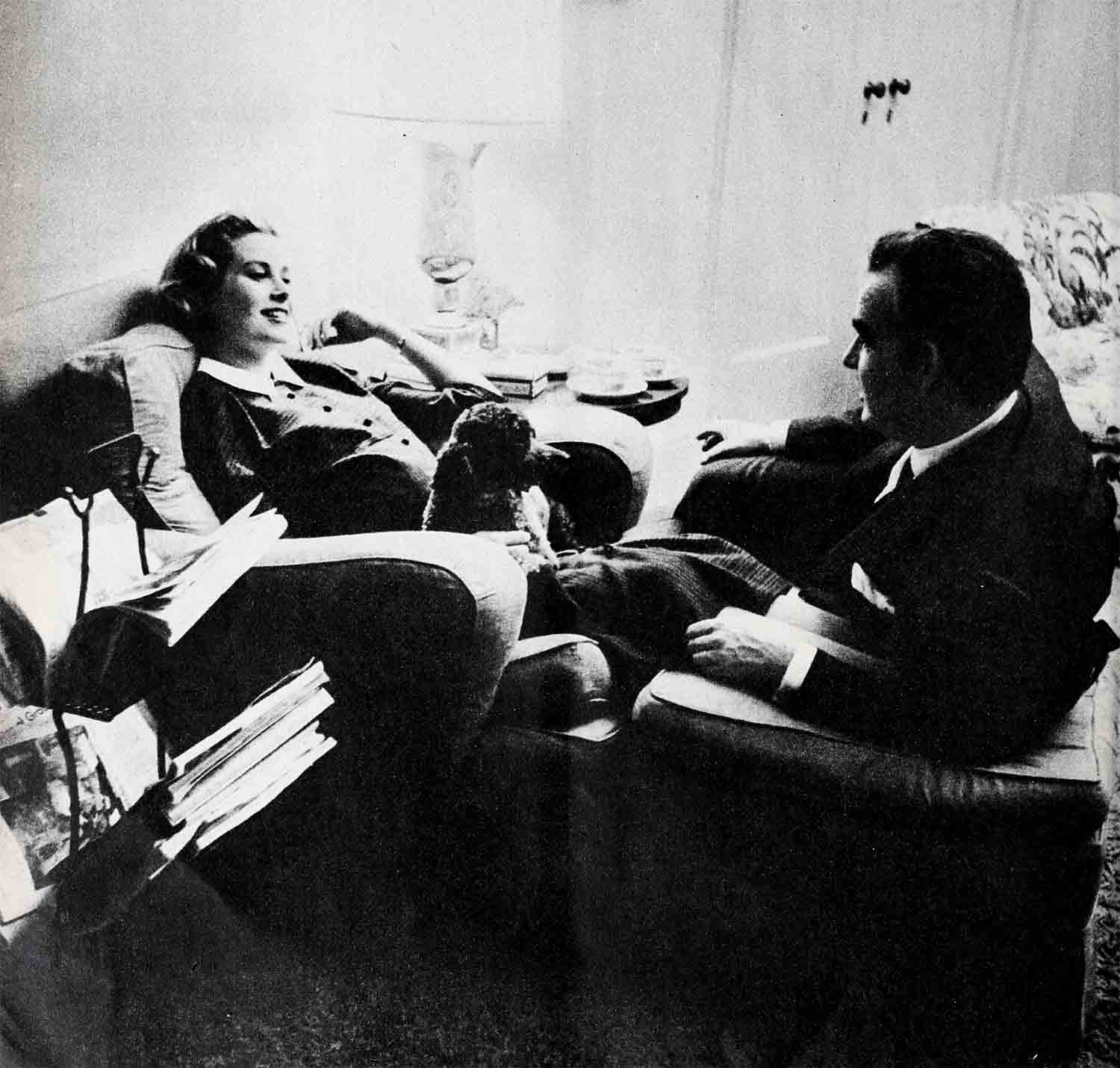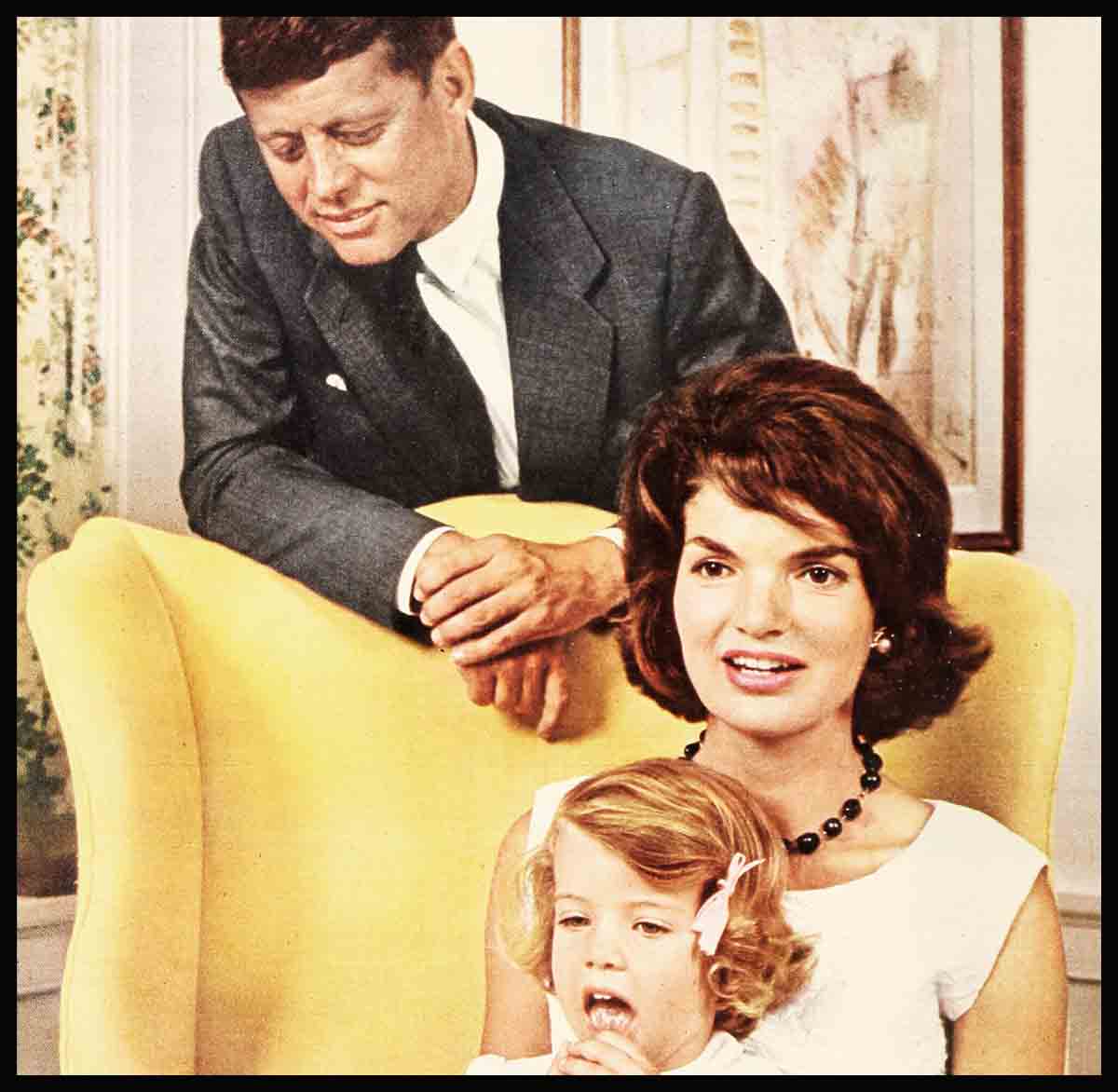
Is Grace Kelly Getting Bored?
People living along the Riviera call Monaco “le bijou”—the jewel. Clinging to the rocky mountainside above the sea, it sparkles and glows with color in the clear, warm sunshine. White, gleaming buildings spot the comparatively new town of Monte Carlo; soft, time-washed pastel-colored houses outline the older part, and everywhere the rich red-tile roofs catch the sunlight, adding gaiety.
There are brilliant flowers everywhere, too. Orange trees line some of the streets, palms and plane trees others. Balconies and window sills are filled with geraniums, petunias and rarer plants. Even the traffic islands in Monte Carlo are decorated with flowers. And the country sparkles with the cleanliness and loving care of its inhabitants.
The palace itself looks like a fairytale castle, sometimes a gloomily bewitched one. Perched atop sheer cliffs hundreds of feet above the sea, its fortress walls enclose it on all sides except that facing the broad square in front. The palace guards, in colorful uniforms, maintain a constant vigil from the red-and-white striped sentry boxes on either side of the great entrance through which only members of the Prince’s family pass.
This is the land—Monaco—for which Grace Kelly gave up her throne in Hollywood, almost a year and a half ago, bringing with her marriage and the birth of Princess Caroline continued Monegasque independence. And what has this brought to Princess Grace? Is there a longing for the glamour of the past?
A tall, slender blonde woman stands at the window of a room—one of 200 in the Palace of Monaco. In her hand, she reads over and over again the question that, in her heart and in her mind, she must satisfy . . . a letter from the United States. Should she go back to that other life, even as briefly as the letter asks?
A discreet sound behind her and Princess Grace turns rather sharply to face one of the people, the responsibilities, she cannot escape: the majordomo asks her decision on a problem from the royal kitchen.
She turns her back on the softly closed door and to her more personal problem. People had predicted: “You will give up too much when you marry Prince Rainier. Your independence, your career, your stardom.” She glanced down at the letter. Suddenly, the words loomed up at her: “Would you be interested in making a movie, if it could be filmed in Monaco?” Her mind darted back.

Just a few weeks before she was married, in April, 1956, Grace had talked enthusiastically about the possibility of doing another picture. (She had been slated for “Designing Woman”), and the proposal of a Broadway play. At almost the same time, over in Monaco and, apparently, without consulting her at all, Prince Rainier was announcing that it had been definitely decided she would never act again. It was not fitting, he indicated firmly, for the consort of the ruler by divine right of a European state to toil for money, even as a world-famous actress.
Quiet and gentle as she was, the old Grace Kelly could never be pushed to do anything against her will. If it were right for her, she did what people asked willingly, happily. If not, wild horses could not make her. There were scoffers who said this girl and the scion of the royal Grimaldis would clash. There were skeptics who said she would never be able to give up the heady delights of movie stardom. The letter in the blonde girl’s hand suddenly felt heavy as she thought of those clamoring voices.
But, to date, Princess Grace has done no acting. She, who had so often refused to let others control her life, accepted her future husband’s decision submissively, and has given no sign that she is not happy doing it. But are there no secret pangs?
Acting and her success gave Grace an immense satisfaction for which it would seem hard, if not impossible, to find a substitute. Has she really found satisfaction in being the eternally smiling focus of royal ceremonies before the adoring people of Monaco, the sober lady do-gooder chairing meetings of the Monacan Red Cross?
The Grace Kelly of two years ago moved among brilliant and witty men, chic and intelligent women. Talented musicians, writers, and actors surrounded her, and many of them adored her. Her days were filled with the excitement of creative work, stimulating company, iridescent conversation. She herself was a leader in beauty, in artistry, in clothes. She was hailed as one of the world’s best-dressed women.

Today, Prince Rainier chooses many of her clothes. At the beginning, Princess Grace sometimes disagreed with his selections—but she always gave in dutifully. Now it is being said by those who have seen her recently in Switzerland that, jeweled and royal though her raiment is, from the viewpoint of chicness and high fashion, Princess Grace is showing signs of dowdiness! “She used to have a superb fashion sense,” one friend has remarked ruefully. Princess Grace has been seen to wear the same dress over and over again, though she can well afford new ones.
As for exciting company, aside from the official visits of brilliant personalities like President Coty of France and Sir Winston Churchill, the social whirl of a princess is limited. Her subjects curtsy and kiss her hand. The members of her household hang on her every word. A small number of old friends, such as the Cary Grants, the David Nivens, Jay and Judy Balaban Kanter, drop in to visit her whenever their mutual busy schedules permit it. But all that hardly compares with the social life she enjoyed in the old days.
Another old friend, Rita Gam, in a conversation just before the royal wedding, pictured Grace as hoping to spend a good part of her time in Paris, visit London and New York often to see all the plays, and cause frequent happy flurries in the social purlieus of Philadelphia. The reality has not been anything like that. Since months before the birth of Princess Caroline, Grace and Rainier have hardly left Monaco, and then chiefly on stiff official excursions, or to their lovely Swiss retreat.
The tiny group of intimates who are most frequently at the palace is made up almost exclusively of Rainier’s past associates. Particularly his sister, the Princess Antoinette. This handsome and regal lady was his official hostess when the Prince was a bachelor, and no doubt it was with some regret that Antoinette gave up the prerogatives of that position to her brother’s young American wife. Under the circumstances, it must have taken some delicate handling for a bride far from home to work her way into the social leadership of a highly sensitive, closely knit circle of European aristocrats. She did it, beautifully, and the Princesses Grace and Antoinette are now close and loving friends. But it must have been a strain at the beginning.
There is another side to the story, too. The miniature hierarchy of royal courtiers surrounding the throne of tiny Monaco does, after all, have a comic opera aspect. There are queens in Hollywood who have far more power, bask in far more adulation, than the Princess of Monaco—and Grace Kelly was one of them. Rainier has an ambition to make his consort a true Queen, to have her recognized as such among the royal heads of Europe, including those who did not deign to attend his wedding. There are those who say that it is unlikely that Grace will ever become a true Queen because of politics. Perhaps. But one thing is certain: She will never know how it will feel to be a true American mother and wife. How well can the standards of American motherhood be applied in a sprawling thirteenth-century palace?

Turning from the window, shaking off the moment of idleness, the young matron moves slowly through the tall, empty rooms. She touches a table here, a lovely sixteenth-century marble figure there, the few things she had chosen to be placed where they are. She pictures Caroline running through these spacious chambers, so awe-inspiring for a little girl—and the picture is incongruous. Grace intends to have many children. Their laughter, their shouts, will not always be fitting in the state rooms of the palace of the Grimaldis.
And how does one raise a Princess?
The elderly “nannies,” common in rich and noble European households, have been pictured as dictatorial ogres, who do not brook interference with their young charges, even from royal parents. Grace wisely avoided this problem by taking a young Swiss nurse for little Caroline. Still, you can’t help asking how much does the mother actually see of her child, how often does she cuddle her and play with her—when photographers are not present? Little Caroline has quite a retinue of her own, with a nursemaid and a footman to tend to her wants, as well as the nurse. This could be a deep and wounding problem to a young mother who grew up in the boisterous, love-filled home of the Kellys of Philadelphia.
Pg feature of life in a Monacan palace which differs sharply from that in Pennsylvania is that the husband and father is present all day and every day—and Rainier is no man to leave his presence unfelt. He does his official tasks in an office which has been set up in a tower of the palace.
He eats breakfast, lunch and dinner at home. And, of course, he and Grace meet frequently during the day for official teas, delegations and luncheons. For two people deeply in love, as Grace and Rainier undoubtedly are, this is a delightful situation. But it is one the wife of a New York business executive or Los Angeles supermarket manager would find hard to get used to.
“It doesn’t leave a girl much time for quiet communion with herself,” an American girlfriend of Grace’s summed up. The sort of privacy Grace Kelly had always clung to. Her friends recall finding this shy, elusive woman seated alone before a window in her apartment in New York or Hollywood, quietly knitting or simply looking out into the street. “Grace always lived a secret life of her own,” one friend has said.
Prince Rainier is a charming and sophisticated companion with a delightful sense of humor, especially now that he is so happy. But he was a lonely bachelor ruler with many problems of state for a long time. In those days he was noted for his imperious ways and unpredictable moods. Every inch a royal Grimaldi, off-spring of a 600-year-old dynasty, he was impatient of delays in carrying out his commands, would permit no questioning of his slightest whims. Today, he still is a modern, democratic version of the absolute ruler, by no means the puppet of a palace cabinet or any political forces. He is equally modern in wanting his bride to share his problems—and help share hers.
Prince Rainier’s grandfather and his great-grandfather spent little time in the palace, so it was a dreary place, badly in need of repair, when the Prince ascended the throne eight years ago. He used to avoid staying in it himself. But, together with the Princess, large parts of the palace are being restored. The Prince set up complete workshops in the palace to carry out the restoration and to maintain the buildings and grounds. Some 250 people now work inside the grounds, many of whom live in quarters there.
Any dreariness that remains is inevitable to its size and magnificence. Together, Grace and Rainier designed a small room, informal and intimate, for themselves, a place to retire to at the end of the day. And Princess Caroline’s room is fresh and bright, with sunny pale yellow and white furniture.
After each breakfast, served on the terrace overlooking the magnificent gardens, the Prince and Grace visit the baby, and whenever possible, Grace bathes her and is with her when she is fed. Surprisingly, there is not always a great deal of time. Daily official duties are demanding: delegations; formal luncheons; dictation to a string of secretaries (her fan mail is still over 200 letters a week); Red Cross work; official teas; a quick walk in the garden with her daughter and then back for a hurried change for dinner. As Princess, Grace also supervises the seamstresses, embroiderers and lacemakers in the sewing room, the laundresses in the modern laundry, the cooks, pastrymakers, and apprentices in the kitchens. She consults and directs the gardeners who tend the terraced gardens and park inside the grounds and maintain the greenhouses that keep her private apartment and the state rooms supplied with cut flowers and potted plants in bloom the year round.
Several times a week she and the Prince have dinners for diplomats accredited to the principality, members of the government, visiting dignitaries. But twice a week, they plan quiet dinners—often on trays—in what they call the Playroom. This is a vast former garage that the prince converted into a movie theater—he has as avid an interest in movies as Grace has—and game room. There they see the latest European and American films with members of the household staff.
Saturdays are much like weekdays in Princess Grace’s schedule, except that sometimes she and the Prince manage to get away for a quiet lunch or dinner at one of the picturesque restaurants along the Riviera coast. On one recent excursion to such a public restaurant the two held hands like children all evening and danced almost every dance with each other. Rainier danced once with his sister Antoinette and Grace’s eyes were fixed on him every moment he was away from her, following every step he took.
On Sundays, in the morning, after Mass, they generally visit the palace’s private zoo. Both are lovers of animals. And, if it is not necessary for them to entertain officially, they may take a drive into the countryside or across the border into Italy. The Prince has a fully equipped garage with two mechanics and two car-washers, who keep like new the eleven cars and three trucks at Grace’s disposal. Never fond of driving herself, Princess Grace now has one of several chauffeurs always at her call or she goes out alone with the Prince at the wheel. She has persuaded him to give up his old practice of speeding recklessly. At evenings, they are frequently seen walking hand in hand.
But, is Grace happy? Reports from Europe are highly conflicting. An English publication insists that, despite Rainier’s denials, Grace is expecting a second child in December or January, pointing, out that in recent pictures, she appears to be expecting. But the Paris weekly, Aux Ecoutes, reports, “indiscretions leaking from the Grimaldi palace confirm that a good understanding no longer exists between the Prince and the Princess.” This “chill,” the paper states, is caused by jealousy on the part of the Prince and misunderstandings about money. According to Aux Ecoutes, whenever Grace goes shopping Rainier has a lady in waiting and two carloads of detectives accompany her. Also, “the Princess believed her husband to be very rich, while the Prince had harbored illusions about his father-in-law’s liberality.” Yet some observers in Monaco deny these tales, pointing out that at a recent ball Grace and her Prince danced until 3:00 a.m., when it is customary for them to leave at 12:00.
However, there is one strong indication that Grace is planning to resume moviemaking. Recently, Lew Wasserman, an executive of the huge American talent agency, MCA, went to Europe for the sole purpose of talking over such a plan with Grace. She would form her own Monacan Film Co., giving ten percent of the proceeds to the Monacan government, and having her films released through M-G-M, where she is still under contract and listen as “on suspension.” Some speculate that this is a move on her part to ease the tension over finances and make her marriage more serene.
And there is something else . . .
Grace Kelly once confessed to a reporter that she was secretly very happy about the occasional torrential rains in California, where she then lived. “I get a dull feeling when it’s hot and sunny all the time,” she said. “I feel tired. I don’t want to do anything. I usually stay in the house when the sun is out, and take my walks all by myself at night.”
Right now Princess Grace lives on the gleaming, sun-bombarded Riviera, where she is continually bathed in the glare not only of the brilliant ball in the sky but of the unrelenting limelight of a royal personage. No longer can she take lonely walks at night. It is impossible for Her Serene Highness to refuse to face the sun, or her subjects, or the duties of her position, no matter what her secret yearnings.
Perhaps there is a deepseated ache in her heart for the freedom, the rapturous recklessness of a cavort in the rain.
But only the tall blonde woman, standing in the middle of a vast room somewhere in the depths of an Old World palace, a crumpled letter from America in her hand, can really say.
THE END
It is a quote. PHOTOPLAY MAGAZINE NOVEMBER 1957





No Comments